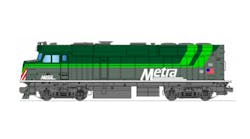One word to describe yourself: Coffee
Alma Mater: University of Illinois at Chicago
Fast fact about yourself: Before my career in transit, I was a floral designer.
What’s your best experience on transit and what made it memorable? I was moving from the near south side of Chicago to the north side along the same major corridor and had a narrow window of overlapping apartment leases. I managed to move my small studio, one or two suitcases at a time, through a series of bus trips. One pickup truck trip finished the job. I was fully moved in and feeling proud.
Kara Komp serves as project manager II at HNTB and deputy program manager for the Red Line Extension (RLE) project – the largest project in Chicago Transit Authority (CTA) history. RLE will extend CTA’s busiest rail line to the far south side of Chicago, Ill., which is a largely economically disconnected area where 25 percent of residents live below the poverty level.
When she first joined the RLE program as an entry-level planner, Komp identified gaps and worked to cultivate strong relationships with CTA staff to understand how she could help develop the RLE project. Today, as deputy program manager, Komp is charged with strategic decision-making alongside CTA executives.
Since joining HNTB in 2018, Komp has been promoted five times, building her career on initiatives that ranged from financial plans to federal interface to project delivery.
Komp was tapped to lead RLE through the Capital Investment Grants (CIG) New Starts program, which requires CTA to navigate a complex multiyear, multiphase process to secure billions in competitive federal grant funding.
Her efforts have positioned the CTA to secure nearly $2 billion in CIG funding, marking the largest infrastructure grant for CTA yet. To secure the grant, Komp helped oversee the implementation of a local funding source: Transit Tax Increment Financing. The RLE Transit TIF, expected to generate nearly $1 billion in incremental property tax revenue, is an “Equity TIF” — the first of its kind — that leverages the success of Chicago’s downtown to fund the RLE transit investment and transform neighborhoods farther south.
Securing the RLE Transit TIF was not guaranteed, as TIF designations require technical analysis to assess feasibility and a robust public process culminating in a city council vote. Komp and her team worked for years to lay the groundwork before the formal designation process with the city of Chicago even started. Komp helped to position the RLE Transit TIF for success by working with elected officials and shaping early efforts to pass a legislative amendment in the Illinois General Assembly to streamline the designation.
Komp also partnered with the CTA to win more than $130 million in competitive grants for RLE’s local match requirement, including the $100 million Carbon Reduction Program award and $30 million Congestion Mitigation & Air Quality award.
In 2023, Komp was recognized nationally as an American Public Transportation Association (APTA) Emerging Leader. Komp notes the Emerging Leaders Program has played a major role in exposing her to diverse approaches to project implementation, especially from the public-agency perspective. Komp is now a member of APTA’s innovative funding/finance/P3 committee.
She has also served as a Women’s Transportation Seminar Board member and a member of the American Council of Engineering Companies Emerging Professionals Committee.
What is an accomplishment you would like to work towards in your career?
Continuing to tip the scales in favor of transit. We’ve seen a federal influx of infrastructure investment. Now, there’s huge momentum for projects like intercity passenger rail through the Corridor ID program, as well as enterprises like Brightline. People want alternatives for getting to places they want to go.
Another goal I’m working towards is having the industry return to that well-established nexus of transit and real estate development. Land use patterns have a significant impact on the success of transit systems. Density makes for strong origins and destinations and increased transit service can incentivize new development as well. These factors create a virtuous cycle for transit, including opportunities for value capture mechanisms.
What do you enjoy most about your job?
I think advocacy comes in many forms. We often hear community voices and see how that can ignite ideas into motion. To me, the other aspect of advocacy is delivery. That practitioner side. You need both.
What I enjoy most about my job is the “getting it done” -- delivering transit projects, no excuses. For the benefits of infrastructure to be realized, projects need to get political support, get funded (most importantly) and get constructed. Honestly, it’s a bit of a miracle that major transit projects come to be, considering the competing priorities and obstacles they contend with.
Best advice/tip/best practice to share from your area of expertise?
Don’t let perfect be the enemy of progress. Make the best decision you can in a timely fashion and just keep going.

Eman Abu-Khaled | Associate Editor
Eman Abu-Khaled is a graduate of Kent State University with a bachelors in journalism. She works through Endeavor Business Media with Mass Transit as an associate editor. Abu-Khaled brings a fresh perspective to the visual side of journalism with an interest in video and photography work.







